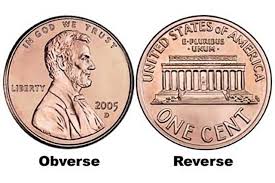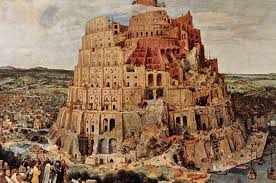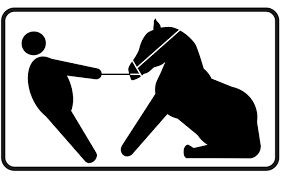 Every coin has two sides: the obverse (we call it “heads”) and the reverse (we call it “tails”). In a football game, just after everyone is scandalized by the positions of players on the sidelines while the National Anthem is played, a “coin toss” is sometimes made to determine the favored position for one team over another. Because of its method, it is generally considered a fair and random selection. One team will get to choose to “kick off” and the other “receives” the ball in the opening drive, determined by the toss. In all the coin tosses I have ever seen, the coin lands on either the obverse of the reverse, and never on the wafer thin side. As fans, we want to believe the ball has not been deflated and the coin toss was completed in a fair way. Perhaps it is.
Every coin has two sides: the obverse (we call it “heads”) and the reverse (we call it “tails”). In a football game, just after everyone is scandalized by the positions of players on the sidelines while the National Anthem is played, a “coin toss” is sometimes made to determine the favored position for one team over another. Because of its method, it is generally considered a fair and random selection. One team will get to choose to “kick off” and the other “receives” the ball in the opening drive, determined by the toss. In all the coin tosses I have ever seen, the coin lands on either the obverse of the reverse, and never on the wafer thin side. As fans, we want to believe the ball has not been deflated and the coin toss was completed in a fair way. Perhaps it is.
Yet, life is not a coin toss of random events. Most of what we face is the inevitable, even if unintended, consequences of earlier choices. That isn’t always true, but if you take your day apart, you will find it is MOSTLY true. If there is a true “coin toss” we face, it isn’t a random selection, but the choice of one of two directions when faced with uncertainty.
Let’s say it this way: you can respond to the unknown in faith, or in fear – it is like tossing up the coin (in that it is a choice and brings specific results). Whichever side of the coin you choose, the other side is still present, but has been hidden by your favored choice. In the opening story of the Patriarch Abraham in Genesis 12, we see this simple principle at work in two successive moments in Abe’s life, each moment defined by which side of the coin he followed. The key truth becomes obvious when you really take the time to look through the chapter…
Key Principle: When I trust God, I walk in faith. When I am driven by the fear of circumstances, I walk in failure.
This is one of the simplest “basic truths” of our faith, and we mention it as part of our “boot camp” series.
To set the stage, let’s think through three ideas we have been following in our walk through Genesis.
• We know the opening chapters of the first book of our modern Bible collection offers some basic “story lines” for the whole collection.
• We know some basic ideas of how the book came together and is blended from story to story.
• We know what we have learned from the major figures we have encountered.
Look at these three ideas for a moment:
First, there are five major “story lines” of the Bible. (This is a paraphrase of something I was introduced to by Doug Greenwold at Preserving Bible Times years ago).
• Genesis opened with the Creator. His existence and His character is referenced in tandem with His work. Genesis offers some basics on Who He is, and what He cares about can be seen in Genesis 1.
• The story continues with the introduction of the Adversary of God. His character can also be seen woven into the details of the story. Who he is and how he works can be seen in Genesis 2 and 3.
• The Mutiny of man is made clear in the story of the “Fall of Man” as mankind sides with the enemy against the Creator God.
• The Human Condition is highlighted in the stories after the “Fall of Man” in Genesis. These stories explain why things are broken, why relationships fall apart, why children are born with maladies, etc. This is even used as a primer on why men killed each other.
• The final storyline is made plain in Genesis 12, where the Plan of Redemption is highlighted. God shows a way out of the mess that He alone can provide.
Second, in our short study of each major character of Genesis, we find out something important that can advance our walk with God. For instance:
• In Adam and Eve we saw God’s prime ethic was love, and with that came the essential inclusion of choice. That explained for us the way a perfect man and woman in a perfect garden could be pulled from following a Perfect God.
• In Cain and Abel we saw the infection of jealousy, the pain of betrayal, and how those led men further from God.
• In Noah we saw that even one who followed God could get ‘burned out” and end up building things that (though they offered lasting results) were not in keeping with the height of his great call.
Third, we understand the Book of Genesis was originally divided into ten sections plus a prologue.
Each section began with the words “These are the generations of…” It is essentially a series of dramas. The sections that lead us to our story are as follows:
Gen. 1:1-2:3 Prologue: “Seven Days of Creation”
Gen. 2:4-4:26 Generations of Heaven and Earth: What went wrong.
Gen 5:1-6:8 Generations of Adam (or man): The hidden prophecy of God’s coming judgment.
Gen 6:9-9:29 Generations of Noah: The story of a man who followed God, but suffered the pain of his world falling apart.
Gen 10:1-11:9 Generations of Noah’s sons: The powerful story of how some of the generations Shem, Ham, and Japheth simply let the message of God go and framed lives in paganism and humanism.
Now our story moves into the:
Gen 11:10-26 Generations of Shem – Ten selected generations to establish the line of blessing to Terah
Gen 11:27-25:11 The Generations of Terah – Life and Times of Abraham
The backdrop of the family is further given in Genesis 11:27. Scripture establishes four details concerning Abraham’s background that we must understand to understand the story about him:
1) The players of the story (11:27-29).
Genesis 11: 27 Now these are the records of the generations of Terah. Terah became the father of Abram, Nahor and Haran; and Haran became the father of Lot. 28 Haran died in the presence of his father Terah in the land of his birth, in Ur of the Chaldeans. 29 Abram and Nahor took wives for themselves. The name of Abram’s wife was Sarai; and the name of Nahor’s wife was Milcah, the daughter of Haran, the father of Milcah and Iscah.
2) Sarah’s barrenness (11:30)
Genesis 11:30 Sarai was barren; she had no child.
3) Abraham’s family loyalty and obedience (11:31-32)
Genesis 11:31 Terah took Abram his son, and Lot the son of Haran, his grandson, and Sarai his daughter-in-law, his son Abram’s wife; and they went out together from Ur of the Chaldeans in order to enter the land of Canaan; and they went as far as Haran, and settled there. 32 The days of Terah were two hundred and five years; and Terah died in Haran.
4) Abraham received a call and the move of his father helped move him to obedience (Acts 7:2). Acts 7 tells the story with additional details:
Acts 7:2 And he said, “Hear me, brethren and fathers! The God of glory appeared to our father Abraham when he was in Mesopotamia, before he lived in [a]Haran, 3 and said to him, ‘Leave your country and your relatives, and come into the land that I will show you.’ 4 Then he left the land of the Chaldeans and settled in Haran. From there, after his father died, God had him move to this country in which you are now living. 5 But He gave him no inheritance in it, not even a foot of ground, and yet, even when he had no child, He promised that He would give it to him as a possession and to his descendants after him.
There it is: We have the storyline of redemption introduced powerfully to a loyal family man with a barren wife. We have a God Who makes promises, but expects something in exchange – our trust.
Let’s see if we can pick out the idea from Genesis 12:1-8 that helps us understand the “Beginning the Faith Walk.”
Look at the simplicity of trusting God and walking in His promises. Don’t lose track in the detail of the simple truth: When I trust God, I walk in faith. When I am driven by the fear of circumstances, I walk in failure.
The beginning of chapter 12 offers five steps toward a “faith walk” with God:
Step One: “Get forth from your country.” Recognize the “trust exchange.” God’s promises always come at the same price – Trade what you see for what you cannot, based solely on His Word! (12:1).
Genesis 12:1 Now the Lord said to Abram, “Go forth from your country, and from your relatives and from your father’s house, to the land which I will show you;
Step Two: “I will.” Understand clearly the source of the blessing. All God’s promises are rooted in His Word to us – it is what we have to follow Him by! (12:2). It is not because of some intrinsic goodness in you that blessing comes. It comes by choosing to believe Him.
Genesis 12:2 And I will make you a great nation, and I will bless you, and make your name great; and so you shall be a blessing…
Step Three: “I will bless those who bless you.” Acknowledge the nature of His plan. God isn’t just trying to “get” you – He has a plan to use the life He lent you to reach into the lives of others. Both our following and our failure to follow have broader consequences than the immediate! (12:3).
Genesis 12:3 And I will bless those who bless you, and the one who curses you I will curse. And in you all the families of the earth will be blessed.
Step Four: “As the Lord had spoken to him” – Wear the mark of obedience. It is not mental ascent nor theological acuity that becomes key marks of a faith walk – it is obedience! (12:4-5).
Genesis 12:4 So Abram went forth as the Lord had spoken to him; and Lot went with him. Now Abram was seventy-five years old when he departed from Haran. 5 Abram took Sarai his wife and Lot his nephew, and all their possessions which they had accumulated, and the persons which they had acquired in Haran, and they set out for the land of Canaan; thus they came to the land of Canaan.
Step Five: “There he built an altar.” Respond to the call in gratitude. Note that God was blessed when Abraham gave Him worship in the form of giving back to God his own things! Worship includes offering God a visual sign of your trust for the future, and a desire to follow His call.
Genesis 12:6 Abram passed through the land as far as the site of Shechem, to the oak of Moreh. Now the Canaanite was then in the land. 7 The Lord appeared to Abram and said, “To your descendants I will give this land.” So he built an altar there to the Lord who had appeared to him. 8 Then he proceeded from there to the mountain on the east of Bethel, and pitched his tent, with Bethel on the west and Ai on the east; and there he built an altar to the Lord and called upon the name of the Lord.
While the first half of chapter 12 makes clear the trust exchange and the walk of faith, there is another story that is hooked to that record in the last part of the chapter. It offers the other side of the coin…
The Beginning of the Failure Walk
(Genesis 12:9-13:4)
God gave land to a landless man. He offered a future. Yet, something stirred in Abe to keep walking and look for something more familiar. The hill country of Judah and Benjamin didn’t look like the flat expanse of Haran and Mesopotamia. The rocks, the soil, the landscape – it didn’t look like what Abe dreamed. That wrestling of heart led him to failure – the other side of the coin. This time, he chose to exchange what God promised for what he thought he needed… This is an exercise of “sliding downward into failure” in five easy steps!
Step One: Make moves based on inner feelings. The story begins with discontent. The discontentment with the “place” God put Abram in sent him packing to a “better” place. It also led him into the heart of a series of perils (12:9-10).
Genesis 12:9 Abram journeyed on, continuing toward the Negev. 10 Now there was a famine in the land; so Abram went down to Egypt to sojourn there, for the famine was severe in the land.
We must understand that where God places us is the best place for us to be. When we kick against His revealed will, we may feel we are getting more of our own way, but we are heading for long-term disaster.
Step Two: Create unintended consequences of walking apart from our call. In Abraham’s case, the move he chose to make put him in a sense of peril, and his reaction was fear. The problems brought on by Abram’s choice to walk away from God’s revealed place led him into new problems.
Genesis 12:11 It came about when he came near to Egypt, that he said to Sarai his wife, “See now, I know that you are a beautiful woman; 12 and when the Egyptians see you, they will say, ‘This is his wife’; and they will kill me, but they will let you live.”
In the midst of the peril, fear set in. He found himself frustrated and vulnerable (12:11-12). The problem is that without the assurance that we are in the center of God’s place for us, we are vulnerable to sweeping fear and frustration!
Step Three: Create the need for solutions to problems we weren’t meant to face. In Abe’s case, he found deception might save him. The fear and vulnerability led to Abram trying his best to “cover himself.” He did not turn to God for aid; he solved the problems in the realm of the flesh. After all, he created the issues in his own choice, didn’t he?
Genesis 12:13 “Please say that you are my sister so that it may go well with me because of you, and that I may live on account of you.”
Abe found it easier to lie, and let the poison of deception thwart his testimony to both his wife and his world. His misplaced trust is a notable tip-off to the problem (i.e. “that it may go well with me” in 12:13). The “father of lies” will do his work in us when we have left our “place” and offers the enticing apparent protection of deception. We will be deceived into believing WE can solve our problems, and then DECEIVE others as the lies spread. We cannot be an uncompromising testimony to truths we don’t believe enough to consistently live!
Step Four: Face the world faking a daily faith walk. The encounter Abram had with the world was met amid deception and a total departure from his walk with God. He killed his testimony by reaching out in deception rather than in a genuine walk of integrity (12:14-16).
Genesis 12:14 It came about when Abram came into Egypt, the Egyptians saw that the woman was very beautiful. 15 Pharaoh’s officials saw her and praised her to Pharaoh; and the woman was taken into Pharaoh’s house. 16 Therefore he treated Abram well for her sake; and gave him sheep and oxen and donkeys and male and female servants and female donkeys and camels.
The simple fact is that we cannot effectively “give out” what we don’t truly possess. We cannot urge others to trust a God we do not!
Step Five: Live with unmasked hypocrisy and embarrassment. The encounter with Abram left Pharaoh in worse shape than he was before this “man of God” came to him! In the end, instead of bringing the blessing that should come when a believer enters the scene, Abram brought pain! Pharaoh loathed the God of Abraham!
Genesis 12:17 But the Lord struck Pharaoh and his house with great plagues because of Sarai, Abram’s wife. 18 Then Pharaoh called Abram and said, “What is this you have done to me? Why did you not tell me that she was your wife? 19 Why did you say, ‘She is my sister,’ so that I took her for my wife? Now then, here is your wife, take her and go.” 20 Pharaoh commanded his men concerning him; and they escorted him away, with his wife and all that belonged to him.
It is a truth worth recalling: A believer walking in defiance will bring pain and heartache to the people he should bring blessing to!
What could Abraham do when he destroyed his testimony?
Abraham left the scene (13:1-4) and returned back to the place God put Him. When he came back to his “place” he turned his heart back to God and bowed before Him!
Genesis 13:1 So Abram went up from Egypt to the Negev, he and his wife and all that belonged to him, and Lot with him. 2 Now Abram was very rich in livestock, in silver and in gold. 3 He went on his journeys from the Negev as far as Bethel, to the place where his tent had been at the beginning, between Bethel and Ai, 4 to the place of the altar which he had made there formerly; and there Abram called on the name of the Lord.
When I trust God, I walk in faith. When I am driven by the fear of circumstances, I walk in failure.
When that happens, come back. Go back to the altar and make clear to God you know you were wrong. Leave holding His hand.
“His Eye is on the Sparrow” was written by Civilla Martin, the wife of a Baptist pastor. She described in her own words how she came to write the song. “In the spring of 1905, my husband and I were sojourning in Elmira, New York. We contracted a deep friendship with a couple by the name of Mr. and Mrs. Doolittle—true saints of God. Mrs. Doolittle had been bedridden for over twenty years. Her husband was an incurable cripple who had to propel himself to and from his business in a wheel chair. Despite their afflictions, they lived happy Christian lives, bringing inspiration and comfort to all who knew them. One day while we were visiting with the Doolittles, my husband commented on their bright hopefulness and asked them the secret of their joy in the midst of pain. Mrs. Doolittle’s reply was simple: ‘If His eye is on the sparrow, then I know He watches me.’ The beauty of this expression of simple faith gripped my heart and that same evening I wrote the words for the song.”
The rest, as they say, is history. If you’re discouraged, afraid of the future, or struggling with the problems of today, listen again to the words of this beautiful song: “Why should I feel discouraged? Why should the shadows come? Why should my heart feel lonely, and long for heaven and home? When Jesus is my portion, a constant friend is He. His eye is on the sparrow and I know He watches over me. His eye is on the sparrow; and I know He watches me. I sing because I’m happy. I sing because I’m free! His eye is on the sparrow; and I know He watches me. His eye is on the sparrow; and I know He watches me.” I’M NOT AFRAID, BECAUSE THE WORST THING THAT CAN HAPPEN IN THIS LIFE IS THE DEATH OF MY BODY— AND I AM AN ETERNAL SOUL!
We don’t have to fear death because the worst thing that can ever happen in this life is the death of our body, and we are more than just a body: We are a soul. C.S. Lewis wrote: “You don’t have a soul. You are a soul. You have a body.” Our soul lives inside our body. It’s who we really are, our personality. And physical death cannot destroy our soul, because our soul will live on long after the stars have burned out and the universe has faded away.
(1) I’M NOT AFRAID, BECAUSE IF GOD CARES ENOUGH TO NUMBER MY HAIRS, HE CARES ABOUT THE OTHER DETAILS OF MY LIFE!
I read recently that most humans can only see a maximum of seven items without counting. In other words, if I’m taking care of three children, I can look at the group and know there are three without counting. I can look at six or seven and know they are there without counting. But if I have 12 or 20 children to watch over I have to stop and count, or put them in four groups of five in order to keep up with them.
If you are blonde (a real blonde) you have around 145,000 hairs; if you have black or brown hair you have about 120,000 hairs and if you’re a redhead you only have 90,000.
(2) I’M NOT AFRAID, BECAUSE IF GOD CARES ABOUT A SPARROW WHO FALLS, HE WON’T STOP LOVING ME WHEN I FAIL!
Sparrows are some of the most plentiful, common birds in the world. Where you find people, you’ll find sparrows. They only live in populated areas because they are scavengers of leftovers. Sparrows hop up to you at the outdoor restaurant and wait for crumbs. They aren’t known for their beautiful colors or for their sweet songs. They were cheap and common. Naturalists tell us that there are approximately 35,000 bald eagles in the U.S. and Canada. But who cares enough to count the sparrows? Only God.
I once read a story about a tribe of Native Americans with a unique practice for training young braves. On the night of a boy’s thirteenth birthday, he was placed in a dense forest to spend the entire night alone. Before that night, he had never been away from the security of his family and tribe. One particular young man was blindfolded and led many miles into the wilderness. He was instructed not to remove the blindfold for an hour. On this particular night, dark clouds obscured the moon and stars, and when he removed the blindfold all he could see was utter darkness. Every time a twig snapped, he visualized a wild animal ready to pounce. Every time an animal howled, he imagined a wolf leaping out of the darkness. He spent a terrifying night on the edge of panic, but he didn’t leave. After what seemed like an eternity, the first rays of sunlight began to lighten the eastern sky. Looking around, the boy saw flowers, trees, and the outline of the path. Then, to his utter astonishment, he beheld the figure of a man standing just a few feet away, armed with a longbow and arrow. It was the boy’s father. He had been there all night long.


















